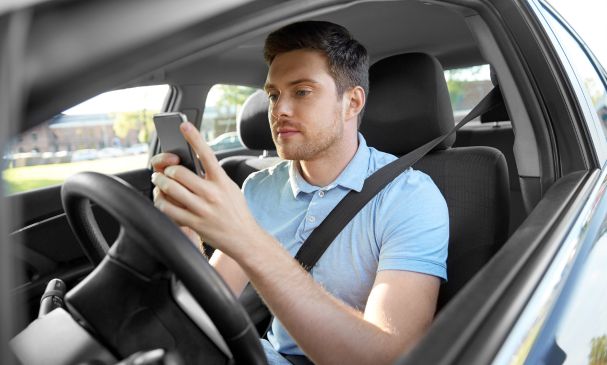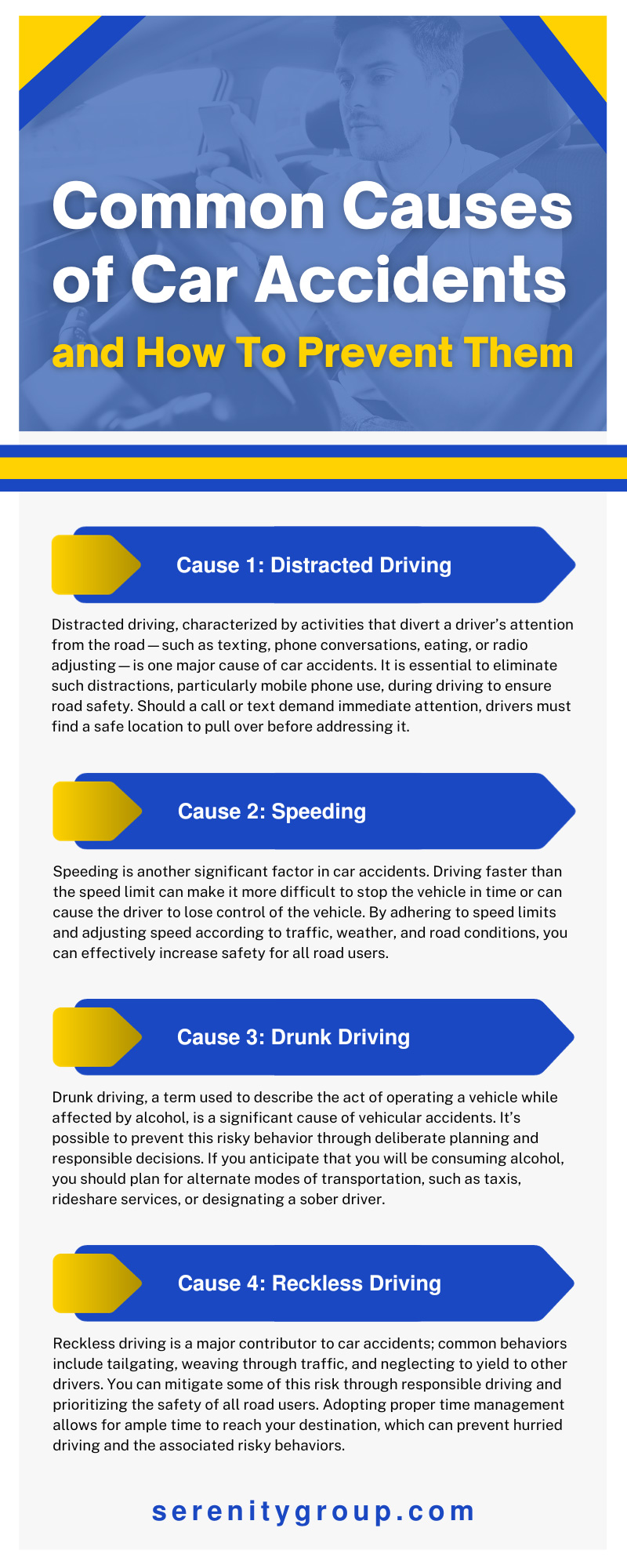12 Common Causes of Car Accidents and How To Prevent Them

No one wants to be in a car accident, yet they remain an unfortunate reality on our roads. Understanding the common causes of car accidents and how to prevent them can help protect you and your loved ones from potential harm and unnecessary expenses. Explore 12 significant causes of car accidents and discover the proactive steps you can take to avoid them.
Cause 1: Distracted Driving
Distracted driving, characterized by activities that divert a driver’s attention from the road—such as texting, phone conversations, eating, or radio adjusting—is one major cause of car accidents. It is essential to eliminate such distractions, particularly mobile phone use, during driving to ensure road safety. Should a call or text demand immediate attention, drivers must find a safe location to pull over before addressing it. Maintaining focus on the road and eliminating distractions is a proactive step toward avoiding potential road mishaps.
Cause 2: Speeding
Speeding is another significant factor in car accidents. Driving faster than the speed limit can make it more difficult to stop the vehicle in time or can cause the driver to lose control of the vehicle. By adhering to speed limits and adjusting speed according to traffic, weather, and road conditions, you can effectively increase safety for all road users.
Cause 3: Drunk Driving
Drunk driving, a term used to describe the act of operating a vehicle while affected by alcohol, is a significant cause of vehicular accidents. It’s possible to prevent this risky behavior through deliberate planning and responsible decisions. If you anticipate that you will be consuming alcohol, you should plan for alternate modes of transportation, such as taxis, rideshare services, or designating a sober driver. The penalties for driving while drunk vary from state to state, but they typically include fines, possible jail time, and the need for SR-22 auto insurance.
Cause 4: Reckless Driving
Reckless driving is a major contributor to car accidents; common behaviors include tailgating, weaving through traffic, and neglecting to yield to other drivers. You can mitigate some of this risk through responsible driving and prioritizing the safety of all road users. Adopting proper time management allows for ample time to reach your destination, which can prevent hurried driving and the associated risky behaviors. Thus, by fostering a patient and safety-conscious driving culture, you can reduce accidents related to reckless driving.
Cause 5: Poor Weather Conditions
Poor weather conditions, including rain, snow, and fog, can lead to car accidents due to reduced visibility and slippery roads. A proactive approach to preventing accidents in these conditions involves cautious and slow driving, ensuring other drivers can see you by appropriately using your headlights and signals. You can also increase your safety by maintaining a larger gap between your vehicle and others on the road. By implementing these measures, you lower the risk of accidents occurring during poor weather conditions.
Cause 6: Running Red Lights and Stop Signs
Ignoring traffic signals, such as red lights and stop signs, often leads to unpredictable movements that can result in collisions. The prevention strategy for this risk is straightforward and involves an absolute adherence to all traffic signals and signs. Ensuring a complete halt at stop signs and yielding to other traffic when required are key actions that can mitigate the risk of such accidents. Through these simple yet critical measures, drivers can contribute to safer roads and reduce the frequency of avoidable accidents.
Cause 7: Inexperienced Drivers
Inexperience is a significant factor in car accidents, as new drivers often have yet to gain the crucial skills and knowledge required to navigate hazardous driving situations effectively. As a preventive measure, novice drivers should take the time to participate in a defensive driving course to enhance their driving abilities. Additionally, parental supervision is pivotal in ensuring teenage drivers gain the requisite experience regarding various driving conditions. Consequently, adequate preparation and management help reduce the rate of accidents induced by inexperienced drivers.
Cause 8: Nighttime Driving
Driving at night poses a higher risk of accidents due to the reduced visibility and potentially increased fatigue. It’s imperative to ensure that your car’s headlights and taillights are functioning accurately for appropriate visibility. Also, adopt a cautious driving approach during nighttime, keeping an eye out for pedestrians, cyclists, and other vehicles. By taking these measures, you can significantly reduce the risk associated with nighttime driving and enhance overall road safety.
Cause 9: Vehicle Defects or Maintenance Issues
Vehicle defects or maintenance issues, including malfunctioning parts or lack of proper upkeep, significantly contribute to accidents, such as tire blowouts, brake failures, and engine problems. Regular and thorough maintenance of your vehicle is an essential preventative measure. Before embarking on any long journey, a complete check of your tires, brakes, and other critical vehicle components is advisable.
Cause 10: Failure To Use Signals
Failing to utilize turn signals or lane change signals can cause confusion and potential collisions on the road. This seemingly minor oversight is an avoidable cause of car accidents. The prevention strategy for this is straightforward—always use your turn signals before making any lane changes or turns, and ensure you check your mirrors before making your intended maneuver. This simple yet vital practice can contribute greatly to preventing road mishaps and maintaining smooth traffic flow.
Cause 11: Fatigue
Driving while fatigued is a significant risk, as it impairs reaction time, judgment, and decision-making skills, making it more challenging to avoid accidents. Adequate rest before driving is crucial, especially before embarking on long trips. You should also take regular breaks during long drives to help reduce fatigue. Should signs of exhaustion manifest, pull over at a safe location and get some rest before continuing your journey.
Cause 12: Aggressive Driving
Aggressive driving, defined by actions such as tailgating, honking, or flashing lights at other drivers, often escalates into dangerous situations and contributes significantly to road accidents. The key to mitigating this risk is maintaining composure and avoiding engagement with aggressive drivers. In circumstances where you see someone aggressively driving, it’s important that you maintain a safe distance between yourself and the offending vehicle. Reporting such behavior to the relevant authorities can help improve road safety and avert potential mishaps.
By understanding and proactively addressing these common causes of car accidents, you can help ensure a safer driving experience for yourself and others on the road. Always prioritize safety and be mindful of your actions while behind the wheel.


Recent Comments